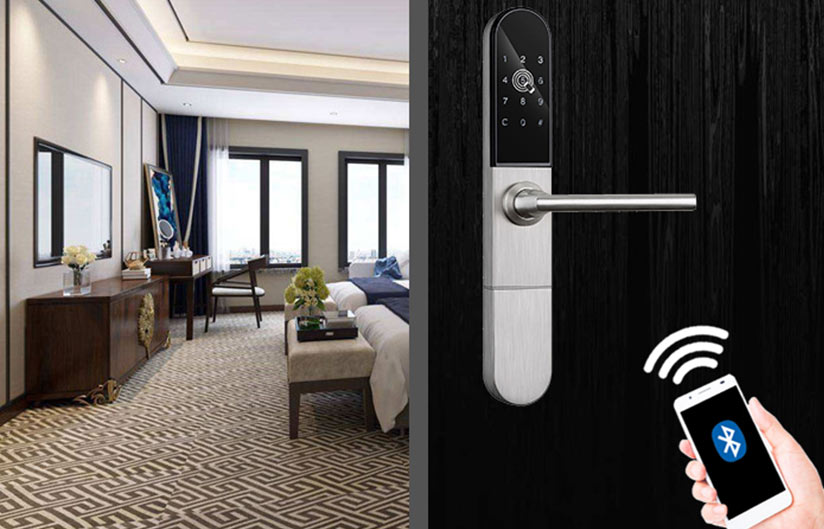May. 26, 2025
Introduction to Pad Lock Materials
When it comes to securing your valuables, the material of a pad lock plays a crucial role. At YORFAN, a leading smart lock manufacturer, we understand that the strength, durability, and resistance of a lock's material are essential for providing optimal security. With advancements in technology, locks such as the electronic cam lock and glass door lock have become more popular, but the core material still determines their effectiveness.
In this article, we will explore the different materials commonly used in pad locks, their advantages, and how to choose the right one for your specific security needs. Whether you're protecting a glass door, a storage locker, or a high-security area, selecting the right material is key to ensuring peace of mind.

Common Pad Lock Materials
1. Brass
Brass is one of the most commonly used materials for pad locks due to its excellent corrosion resistance. This makes it ideal for outdoor use or in environments exposed to moisture. Brass pad locks are both durable and cost-effective, providing a reliable option for everyday security needs.
While brass is a great choice for general use, it may not offer the highest level of protection against cutting or drilling. For applications that require advanced security, such as securing devices like electronic cam locks, other materials may be more suitable.
2. Stainless Steel
Stainless steel is known for its strength and resistance to rust, making it an excellent choice for high-security pad locks. It is highly durable and can withstand harsh environmental conditions, including extreme weather and saline environments. This makes stainless steel locks ideal for outdoor use or for securing glass doors with a glass door lock.
Additionally, stainless steel pad locks are often designed with hardened steel shackles, further enhancing their resistance to cutting and tampering. If you're looking for a robust and long-lasting solution, stainless steel is a top contender.
3. Hardened Steel
Hardened steel is a popular choice for pad locks that require maximum security. By undergoing a hardening process, the steel becomes incredibly strong and resistant to cutting, drilling, and other forms of tampering. This makes it a preferred material for high-security applications, such as industrial settings or securing expensive equipment.
Many smart locks, including electronic cam locks, incorporate hardened steel components to enhance their overall security. However, it is essential to ensure that the lock is also resistant to corrosion if used in outdoor environments.
4. Aluminum
Aluminum pad locks are lightweight and resistant to corrosion, making them a convenient option for low-security applications. They are often used for securing luggage, gym lockers, or other non-critical items. While aluminum locks are easy to carry and use, they may not provide the same level of protection as brass, stainless steel, or hardened steel locks.
For applications requiring higher security, such as securing a glass door lock, aluminum may not be the best choice. However, it remains a practical option for temporary or low-risk scenarios.
5. Zinc Alloy
Zinc alloy is another material commonly used in pad locks, particularly in combination with other metals. It offers a good balance of strength, corrosion resistance, and affordability. Zinc alloy locks are versatile and can be used in various settings, from residential to commercial applications.
Many modern smart locks, including those designed by YORFAN, utilize zinc alloy for their housings due to its durability and aesthetic appeal. This material is especially popular for locks that require a sleek and modern design.
Factors to Consider When Choosing a Pad Lock Material
1. Security Level
The primary factor to consider is the level of security required. For high-security applications, materials like hardened steel or stainless steel are recommended. For low-security needs, brass or aluminum may suffice.
2. Environmental Conditions
If the lock will be exposed to harsh weather conditions or moisture, corrosion-resistant materials such as stainless steel or brass are ideal. This is especially important for outdoor locks or those used in humid environments.
3. Weight and Portability
For applications where portability is essential, such as travel locks, lightweight materials like aluminum are a practical choice. However, for stationary applications, heavier and more robust materials may be preferable.
4. Compatibility with Smart Lock Features
Modern smart locks, such as electronic cam locks and glass door locks, often incorporate advanced features like keyless entry and tamper alerts. The material of the lock must complement these features while providing adequate protection against physical attacks.
Why Choose YORFAN for Your Security Needs?
At YORFAN, we specialize in manufacturing high-quality smart locks designed to meet the diverse security needs of our customers. Whether you're looking for a durable pad lock, an advanced electronic cam lock, or a sleek glass door lock, our products are crafted using the finest materials to ensure reliability and performance.
We understand that every application is unique, which is why we offer a wide range of locks tailored to different environments and security levels. By combining cutting-edge technology with robust materials, we provide solutions that deliver both convenience and peace of mind.
Conclusion
Choosing the right pad lock material is essential for ensuring the security of your valuables. From brass and stainless steel to hardened steel and zinc alloy, each material offers unique advantages suited to specific applications. By considering factors such as security level, environmental conditions, and compatibility with smart lock features, you can make an informed decision that meets your needs.
At YORFAN, we are committed to providing top-quality locks that combine durability, functionality, and style. Explore our range of products today to find the perfect solution for your security requirements.


